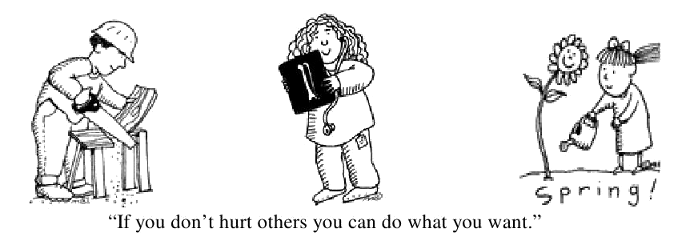Read the Previous Principle, Read the Next Principle, or Return to table of contents
Principle 4: As long as you don’t hurt others you can live as you please

The child planting flowers is doing it because it is fun for her. She is hurting no one. She lives in a democracy, so she does not have to ask the government for permission. Even if someone in the government does not like her, she can still plant flowers. Planting flowers is not hurting anyone, so she can do it just because she wants to do it. In some countries you have to have a friend in the government before you can work as a carpenter and build your own house. Sometimes people with no friends in the government are told they cannot do carpentry and build their own house. But in a democracy you can be a carpenter if you want to. You have to do carpenter work safely so no one gets hurt. Is the doctor hurting anyone? No, she is not. So, she can study to be a doctor, pass her tests, and then enjoy being a doctor. No one can tell her she cannot be a doctor. As long as it does not hurt others, you can have any religion you want. As long as it does not hurt others, you can speak any language you like. In a democracy, you can live as you please so long as it does not hurt others.
Story:
“Are you going to tell me why you kids are all alone, with no parents?” So they told her their story. They told about having their village raided and the pirates burning down their house. They told about being dragged to the ship and being locked in the cargo hold at night. They even told about how scared they were walking up to her house and how they could smell breakfast cooking inside.
“We were glad you turned out to be so nice,” Petra offered. “I wish we could see our parents again ... but I don’t think we ever will,” she added in tiny and far away sounding voice.
“I don’t think so either,” added Nadesh. “I hate the captain and his crew of pirates! They had no right to burn us out and then steal us! And what’s worse,” he added, “our parents are probably gone for good.”
Feeling her anger too, Petra jumped in, “And I hate how they kept saying, ‘we can do anything we want!’ and they knew we couldn’t do anything about it. We’re just kids!”
“I feel angry at those mean pirates too,” said the jewelry lady. “By the way, my name is Elena, and I can tell by now that you are Nadesh and Petra.” There was a long silence. Then Elena spoke again. “We live in a democracy here in Big Tree Land. And that means people can do whatever they want—that is, and mark my words well—so long as they don’t hurt others! It has always been like that. Do whatever you want, just so it does not hurt others! And those pirates, who burned your house, did bad things to your parents and stole you—well, they were hurting others and that made it wrong!” Elena seemed really upset with the mean pirates. “They better never show their faces around here. We’ve got laws and we know what to do to people who break the law! Those pirates aren’t fit to live in a democracy.”
While it didn’t undo the past, it felt good to Petra and Nadesh to have their new friend, Elena, on their side. It sure felt like if those pirates ever showed up in Big Tree Land they would have a lot of explaining to do. To be continued....
Activity: “Children, it is entertainment time.” (Start with an activity that hurts no one) Example: “Anna, will you come up front and sing a song for us?” Ask the other children, “Will Anna’s singing a song hurt others?” No, it won’t. If time permits, have her sing. If not, thank her for being willing. Now, for demonstration purposes, select, a “hurts others” activity. Perhaps, “Philip, come up front with Samuel and show us how you can beat him up!” Then, “Oh no, wait! Children, can Philip do this just because he wants to?” No, No. “Why not?” If they do not answer readily, coach them to see that he cannot do it because it would hurt another person. On the other hand, Anna could sing, just because she wanted to AND it did not hurt anyone. Use other activities, alternating between “hurts others” and “does not hurt others” until the concept is understood by most of the children. (Example: Take money without asking versus ask to borrow money, give a compliment versus call another a bad name, and so on.)
Read the Previous Principle, Read the Next Principle, or Return to table of contents